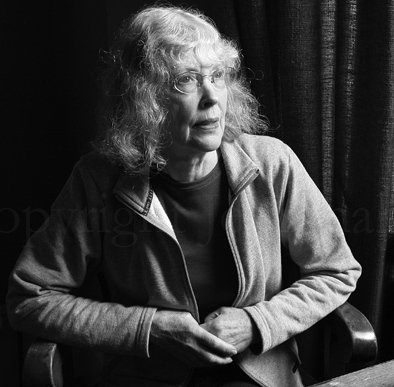Close Reading Fleur Adock
Fleur Adcock was born in New Zealand in 1934 and moved to Britain in 1963 where she lives today. Although Adcock began writing poems in New Zealand, a lot of her poetry has an ironic mood camouflaging fear or anxiety – providing her work with an English tone. Her most successful poems are ones about apparently marginal or peripheral locations. The poet Ruth Padel says, ‘she is a poet of no solutions: of giving you what’s there then standing back and seeing what you make of it.’
This neat little ‘Video’ clip of a poem offers a snapshot into a family’s life like a short film. Each line of the first stanza is like a new angle taken by a camera. The shots seem straightforward enough, but then notice the way the third line flows into the fourth. This occurrence in verse is called an enjambement, which means the continuation of a sentence beyond the end of a line, coming from the French enjamber, meaning to stride, or as Stephen Fry titillatingly puts it, ‘getting one’s leg over.’ The mind naturally pauses, if only briefly, before switching to the next line, so when ‘and Ceri’ pops up it appears tacked on, suggesting that Ceri is becoming part of the furniture and not the focus.
 Adding to that tone, the enjambment abruptly comes to a full stop – literally! This pause in the middle of the line has a name too – it’s called a caesura, (coming from the Latin meaning, cut or hew). This allows the four words of dialogue spoken by dad, ”Move over a bit,” to make a stronger impact; even if only subconsciously – both these technical devices create a subtle tension which are at the centre of the piece.
Adding to that tone, the enjambment abruptly comes to a full stop – literally! This pause in the middle of the line has a name too – it’s called a caesura, (coming from the Latin meaning, cut or hew). This allows the four words of dialogue spoken by dad, ”Move over a bit,” to make a stronger impact; even if only subconsciously – both these technical devices create a subtle tension which are at the centre of the piece.
Another interesting Latinate word to throw into the mix here is stanza. In poetry, it means a group of lines set off from other lines in a poem using spacing. This poem has two stanzas. In Italian, stanza means room, which suggests an image of the poem as a house with many rooms. We are shown two rooms: the first is the parent’s bedroom and the second is probably the sitting room – or what is more accurately called these days the TV room. Mum is ‘twice as busy’ putting all her energy into the new baby – reminding us that Ceri is not getting the attention she would like.
After ‘busy’ comes another slight caesura where the camera cuts to Ceri playing the ‘video again and again.’ Ceri, via video, has the power to whisk her little sister back to where she came from. ‘Again and again’ gives a comedic picture of a baby coming in and out of mum, but it also makes Ceri’s pain that much more palpable as we culminate to the final gut-punchline,
‘in reverse, she made her go back in.’
The word reverse is worth mentioning, hinting towards its sibling, verse, reminding us we are reading a bit of verse. The Latin origin actually means a turn of the plough. (Farmers may be fascinated to discover that poetry has its roots embedded in agriculture! Incidentally, our greatest living poet, Seamus Heaney grew up on a farm.) After making a furrow along a field the plough turns round, to make another similar furrow, just as lines of verse follow a set metrical pattern. Ceri is creating her own verse, or re-verse by playing Laura coming out and going back ‘in again and again’. Notice too, that the lines ploughed out in this poem all have neat little near rhymes or close rhymes – which help smooth the edges of this fraught piece of sibling rivalry – like a well edited film noir.
It is said that reading prose is like walking into a dark room and switching on a light, and poetry is like walking into the same room and switching on a torch. You may not see everything around you at once but what you do see becomes more intensified by the single beam. For torch also read camera!
Fleur Adcock: Poems (1960-2000) is published by Bloodaxe books.

